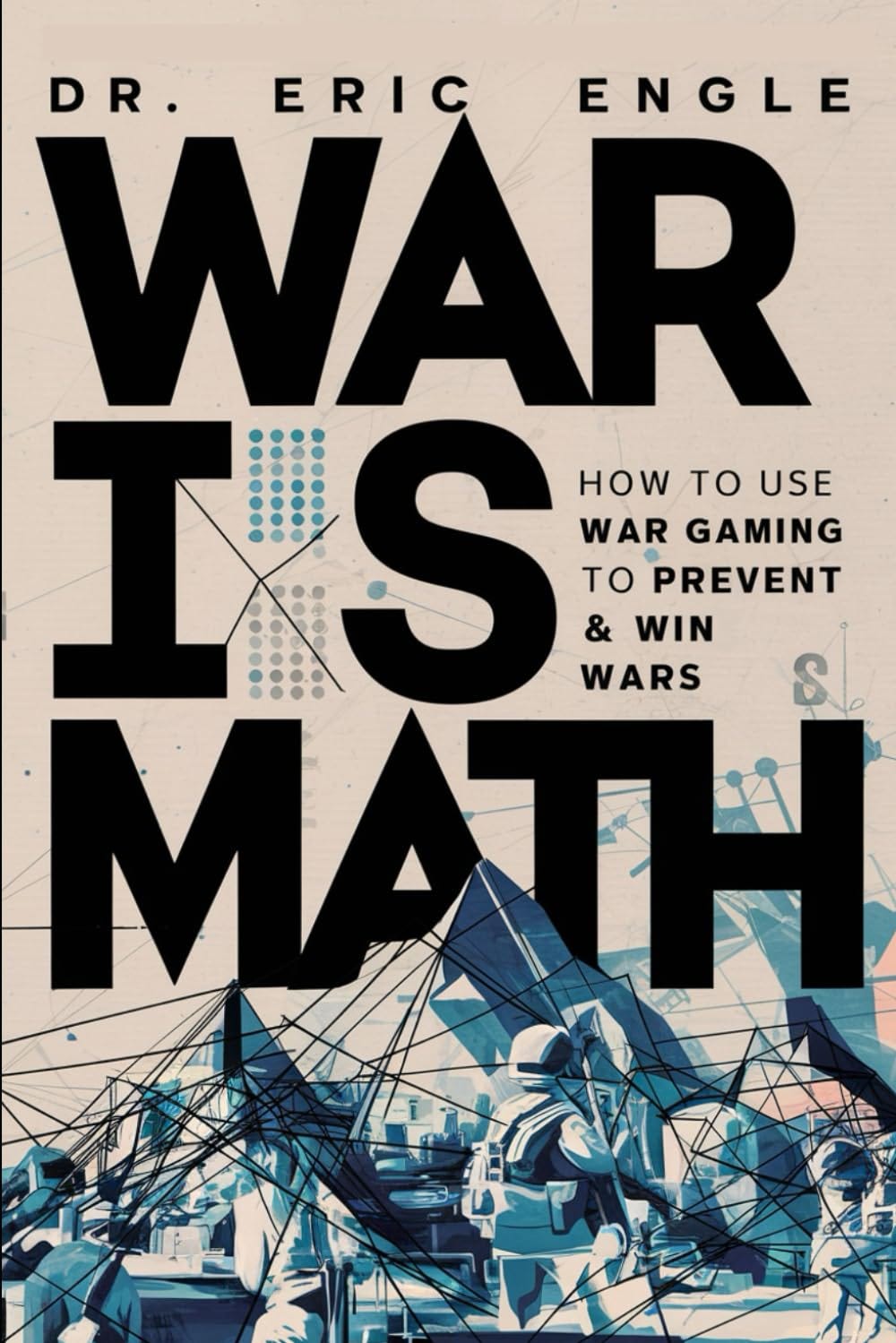Smarter people, and I am one…
If only. Please God, make me less stupid.
Despite our best efforts, all of us—even the smartest people—fall victim to cognitive biases. These mental shortcuts, while useful for survival, shape our views of war, law, and culture in ways we rarely notice. To help you dig deeper, I’m offering free eBooks this holiday season—on topics as diverse as Chinese history, the philosophy of law, and the human cost of war. Let’s unwrap both the gifts and the biases we bring to understanding them. They are your gift, feel free to tell a friend
War is Math: How to Use Wargaming to Prevent & Win Wars
Quizmaster Point of Law Review Negotiable Instruments
"Cheat Codes": How to Pass the Bar Exam
Pictogram Palace: A Chinese Character Dictionary
Contract Law Quiz Questions & Explanatory Answers
Tell a friend
Cognitive Biases: Recognizing the Limits of Our Own Thinking
Cognitive bias is an unavoidable reality of human perception. Each of us, regardless of intelligence, education, or experience, operates within a framework shaped by our past experiences, cultural conditioning, and expectations. These biases, often subtle and subconscious, act as filters through which we process information, assess situations, and make decisions. They influence not only what we choose to examine but also how we interpret what we encounter. Acknowledging that our thinking is inherently limited by these biases can be both humbling and empowering, offering an opportunity for greater self-awareness and wiser choices.
The Perils and Patterns of Confirmation Bias
One of the most pervasive cognitive biases is confirmation bias—our tendency to favor information that supports our preexisting beliefs while dismissing or undervaluing evidence that challenges them. This universal bias affects everyone to varying degrees, regardless of intelligence or expertise. It is most evident in our tendency to interpret ambiguous events through the lens of past experiences, often leading us to reinforce rather than question our assumptions.
For example, in the realm of personal relationships, confirmation bias might manifest as interpreting a partner’s neutral behavior—a delayed text response or a change in tone—as evidence of neglect if one already harbors insecurities about being ignored. This same tendency applies in broader contexts such as politics, where individuals may selectively consume media that aligns with their views, deepening polarization and reinforcing ideological divides.
While more reflective individuals might recognize this propensity and actively seek out contradictory perspectives to counteract it, others lean heavily on familiar narratives for reassurance. This is particularly evident in the realm of conspiracy theories, where the confirmation bias becomes entrenched. Conspiracy theorists actively seek out outlier data to fit their narratives, ignoring overwhelming evidence to the contrary. For instance, flat-Earth theorists selectively interpret scientific findings while dismissing basic principles of physics. Here, confirmation bias transcends mere error and becomes a worldview, one reinforced by echo chambers and like-minded communities.
The Financial World: A Case Study
Confirmation bias also manifests in economic decision-making, with profound consequences. Consider the behavior of "gold bugs"—investors who view gold as an eternally stable and trustworthy asset. Their reasoning often stems from a selective interpretation of history: gold has been a store of value for centuries, therefore it must remain so indefinitely. This mindset leads them to dismiss alternative investments or economic indicators, even in situations where diversification would be prudent. Their failure to adapt to changing financial landscapes underscores the dangers of clinging too tightly to entrenched beliefs.
In contrast, successful investors often cultivate an awareness of their cognitive biases and actively seek dissenting opinions to avoid blind spots. Warren Buffett’s famous admonition to “be fearful when others are greedy and greedy when others are fearful” reflects an effort to counteract herd mentality and the biases that drive irrational market behavior.
Historical Impacts of Cognitive Bias
The dangers of cognitive bias are amplified when they shape the decisions of influential individuals. Adolf Hitler’s rise to power offers a chilling example of how selective and distorted interpretations of reality can lead to catastrophic consequences. Hitler’s fixation on a narrative of racial superiority and national victimhood shaped not only his worldview but also the policies and propaganda that fueled Nazi Germany. This self-reinforcing loop of bias escalated into a collective delusion, resulting in one of history’s darkest chapters.
Similarly, racist and religious prejudices exemplify the destructive power of unchecked biases. These forms of bias often stem from deeply ingrained cultural narratives that frame certain groups as “other” or inferior. The tragic outcomes—systemic discrimination, violence, and even genocide—underscore the importance of confronting and mitigating cognitive bias at both individual and societal levels.
Cognitive Bias as a Double-Edged Sword
Not all cognitive biases are inherently harmful; some are byproducts of mental shortcuts that help us grapple with complex world. Pareidolia, for instance, is the tendency to perceive patterns where none exist—such as seeing faces in clouds or interpreting random noise as meaningful. While often benign, this bias reflects the brain’s evolutionary drive to recognize patterns for survival. Early humans who quickly identified a predator’s shape amidst foliage likely had a survival advantage, even if their pattern recognition occasionally resulted in false alarms.
However, the same propensity for pattern recognition can lead to overinterpretation and misjudgment, particularly in modern contexts where our evolutionary instincts no longer align with our environments. For example, financial analysts might perceive trends in market data that are statistically insignificant, leading to flawed investment strategies.
Bias in Political Discourse
Cognitive bias is particularly evident in politics, where factionalism and oversimplification dominate. Political labels, while convenient for categorizing ideologies, often fail to capture the complexity of individual beliefs. This reductive thinking encourages tribalism, where individuals align themselves with groups that reinforce their biases rather than critically evaluating their own perspective.
For instance, a self-identified libertarian might adhere rigidly to ideals of personal freedom and limited government while overlooking the practical challenges of such policies in addressing social inequality or environmental crises. This adherence to ideology can constrain one’s ability to recognize its limitations, leading to dogmatic thinking. Historical insights, such as those from Federalist No. 10, emphasize the dangers of factions and the necessity of balancing competing interests to achieve effective governance. These lessons remain relevant today, as political discourse increasingly devolves into echo chambers rather than productive debate.
Toward Greater Awareness
The first step in mitigating the effects of cognitive bias is acknowledging its universality. Everyone, regardless of intellect or experience, is subject to biases that shape their perceptions and decisions. This realization is liberating: it allows us to approach the world with humility and curiosity rather than certainty. Recognizing our biases does not eliminate them, but it empowers us to engage with the world enjoying greater awareness and intentionality. By understanding the limits of our own thinking, we take a crucial step toward clearer vision—even if achieving perfect objectivity remains beyond our reach. We may remain, metaphorically, the one-eyed man in the kingdom of the blind, but awareness of our limitations allows us to chart a more thoughtful and informed path forward.









